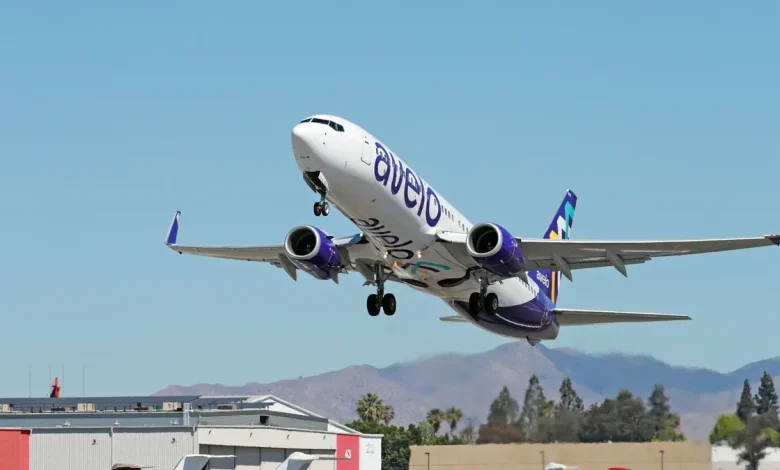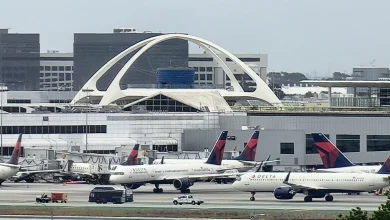How low can airline fares go? Controversial carrier Avelo offers $34 flights to Florida

How airlines use new routes to grow demand
Small airlines use new nonstop routes to spark travel demand and grow their customer base.
- Texas-based airline announced one-way, $34 fares from Detroit Metro Airport to central Florida.
- Low-cost airlines are under increasing pressure as they compete to offer cheaper and cheaper fares.
- The airline has faced a backlash to its ICE contract, which has led to protests and boycotts.
A Texas-based, low-cost airline with a name few are familiar with announced new one-way, $34 fares from Detroit Metro Airport to central Florida early next year, doubling down on seasonal air service in time for baseball spring training season.
“Detroit — say hello to spring training in Lakeland with Avelo!” the Avelo Airlines founder and CEO, Andrew Levy, said in a statement, adding that the carrier aims “to showcase the best of air travel with convenient, affordable and industry-leading reliability to Motor City travelers.”
But amid all the recent bad news in the aviation industry, are next-to-nothing fares and sensational news headlines about them still enough to give low-cost airlines like Avelo the boost that its leadership is perhaps seeking?
Budget airlines arguably revolutionized air travel in the past few decades but have been under increasing pressure in the last few years as they compete with each other to offer lower and lower fares and assure customers that air travel is safe.
In addition, Avelo — specifically — faces political backlash from a government contract it agreed to help deport immigrants.
In all, a half-dozen low-cost carriers now fly in and out of Michigan airports, including Allegiant Air, Breeze Airways, Breeze Airways, Frontier Airlines and Spirit Airlines.
But while Avelo’s announcement comes just as Michiganders begin to think about where else they’d rather be when it’s snowing in February, news reports show people are frustrated with — and concerned about — air travel.
Avelo told the Free Press on Thursday by email that it had “not noticed any major decline in passenger traffic this year” and claimed it is seeing “more bookings come in” as travelers appreciate its “affordable air travel” offerings.
It’s unclear whether this year’s fatal plane crashes and the government shutdown, which led to thousands of flight cancellations, will significantly change air travel attitudes, but news reports and polls show the woes are on people’s minds.
On top of that, in a speech at the U.S. Chamber of Commerce’s Global Aviation Summit in Washington, D.C., United Airlines CEO Scott Kirby said in September that discount airlines were an “interesting experiment” but were failing.
Kirby, obviously, had reason to be critical of his competitors.
Low-cost carriers have long cut into the bottom line of major airlines. But more than being critical of a competitor, Kirby was suggesting that the low-cost carrier strategy — offering tickets that get closer and closer to free — is unsustainable.
‘A sensitive and complicated topic’
Airline industry analysts are closely watching the low-cost carriers.
And they still may be able to wring more money out of flights, yet. An Italian company designed a seat, the SkyRider, that, if approved by regulators, could allow airlines to pack 20% more people onto a plane in a near standing position.
Levy, Avelo’s founder, is familiar with both low-cost and traditional carriers. He was president of Allegiant Air, a low-cost airline based in Las Vegas, and, later, chief financial officer of Chicago-based United.
Headquartered in Houston, the airline previously operated charter flights as Casino Express Airlines and Xtra Airways before rebranding in 2021 with the name it goes by now, Avelo.
But so little is known about it that in its Nov. 12 media announcement, the budget carrier included a lighthearted line on how to pronounce its name: “Hello, Avelo! It rhymes, UH-VELL-O, like yellow or jello.”
The airline said its additional direct flights from Metro Detroit Airport will be to Lakeland Linder International Airport, which is between Tampa and Orlando and only a 20-minute drive to the stadium where the Tigers train.
Flying to Lakeland and other smaller airports, which tend to have lower gate fees but also fewer amenities for fliers, can help keep a carrier’s operational costs down.
Still, in a bit of bad timing, Avelo’s news also came on the same day the 14 people killed in a UPS cargo plane crash in Louisville, Kentucky, earlier this month were identified. Their Ages ranged from 62 to just 3 years old.
The UPS plane, although carrying no passengers, left a half-mile trail of destruction, killing others on the ground as it exploded into flames and collided with several structures, including a warehouse and an auto parts business.
In addition to safety concerns, Avelo also has faced backlash this year for its contract with the U.S. Immigration and Customs Enforcement to operate deportation flights, which has led to protests, boycotts and public scrutiny.
The outrage was so strong, officials in Connecticut, where Avelo also flies, threatened to revoke some of the airline’s tax breaks there.
By some accounts, including Levy’s statement on the contract in April, the airline’s executives considered the deal a financial necessity that allowed the company to expand and perhaps even prevent future cuts.
“We realize this is a sensitive and complicated topic,” the CEO’s statement acknowledged, adding that the deal “will provide us with the stability to continue expanding our core scheduled passenger service” and keep 1,100 crewmembers “employed for years.”
But Democratic U.S. Sens. Richard Blumenthal and Alex Padilla, of Connecticut and California, respectively, also wrote Levy a letter that said it was “deeply disturbing” to them that the airline’s contract was deemed “too valuable not to pursue.”
More routes, ‘reliable air service’
Still, major carriers also have adopted some budget airline’s tactics, neutralizing some of their advantages, while low-cost carriers, to compete with each other, seem to be offering lower and lower fares.
In August, low-cost airline Frontier Airlines announced ticket prices as low as $49 from Detroit Metro Airport to destinations to compete with Spirit Airlines, which just a few days later filed for bankruptcy protection a second time in the year.
By September, Spirit said it was so financially distressed it was planning to furlough 1,800 out of 5,200 flight attendants by Dec. 1 to “align staffing with our fleet size and expected flight volume.”
Avelo’s fares, now at just $34 and even less than the price in Michigan for a full tank of gas, significantly undercut Frontier’s previously promoted low-low one-way fare of $49.
Avelo’s announcement said that beginning Feb. 11 it will begin operating its routes from Detroit to Lakeland twice a week — on Wednesdays and Saturdays — using Boeing 737 aircraft.
Travelers, the airline added, can make reservations at AveloAir.com.
The company also told the Free Press it felt confident that by February, “flying will be back on track” and “as we serve secondary airports, like Lakeland, we also do not feel as much pressure as airlines that are flying to major, super busy, airports.”
Avelo also announced it would offer new routes between Chicago and Concord, North Carolina, and Wilmington, Delaware, and announced what it called the return of three popular routes to Atlanta and Nashville.
And the airline made a point to promote what it called its “reliable air service.”
Still, public confidence in air travel overall seems to be slipping.
After another high-profile crash in Washington in January killed 67 people, a poll by the Associated Press-NORC Center for Public Affairs Research found that worries about air travel increased.
A phone survey of 1,112 adults showed faith in air travel had fallen. Sixty-four percent of respondents said air travel is very or somewhat safe, down from 71% in 2024; and 20% said air transportation is very or somewhat unsafe, up from 12%.
“A majority of the public continue to think plane travel is safe,” the research groups analyzing the Feb. 19 poll said, but after the fatal crashes in Washington D.C., Alaska and Philadelphia, “their confidence is beginning to waver.”
Contact Frank Witsil: 313-222-5022 or fwitsil@freepress.com





